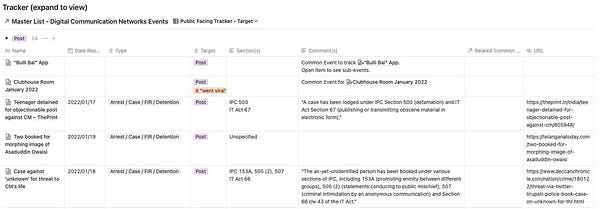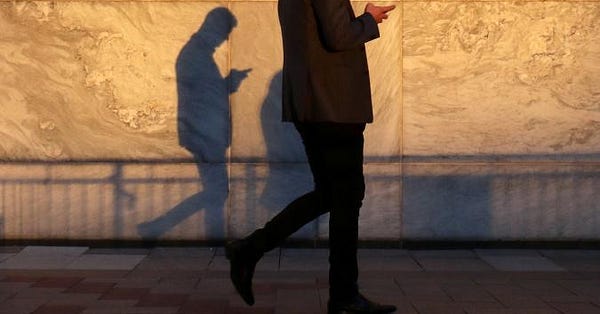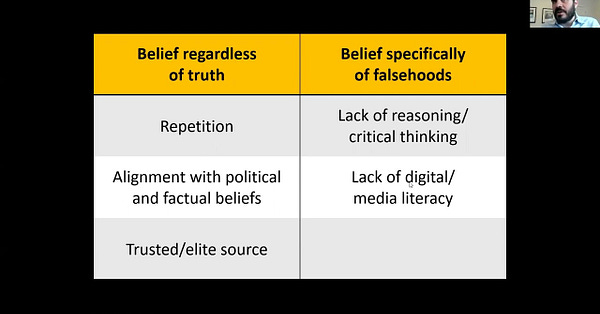What is this? Surprise, surprise. This publication no longer goes by the name MisDisMal-Information. After 52 editions (and the 52nd edition, which was centred around the theme of expanding beyond the true/false frame), it felt like it was time the name reflected that vision, too.
The Information Ecologist (About page) will try to explore the dynamics of the Information Ecosystem (mainly) from the perspective of Technology Policy in India (but not always). It will look at topics and themes such as misinformation, disinformation, performative politics, professional incentives, speech and more.
Welcome to The Information Ecologist 58
Yes, I’ve addressed this image in the new about page.
Note: This edition will likely be shorter than usual. I’ve had to stay away from screens for the last few days, so I haven’t gotten much reading done.
In this edition:
(b)AdTech: CCI’s order in DNPA’s complaint against Google, need for greater scrutiny of adtech.
The many complexities of anonymity: An extract of my response to an oped in The Hindu about ‘the many problems of online anonymity’
The FIR-ing line #2: Some more patterns, updates from my efforts to track arrests/cases/FIRs related to posts on social media in India.
Miscellaneous: Unlikely to be a regular feature, just a few interesting links/threads that I came across.
(b)AdTech?
Earlier in January, the Competition Commission of India (CCI) published an order directing a detailed investigation into allegations of anti-competitive practices against Google by the Digital News Publishers Association (DNPA). We did an episode of All Things Policy on this particular order (if you prefer podcasts over reading).
Worth noting that DNPA represents the digital arms of legacy media houses. The 2 other significant bodies are Digipub (Newsminute, Newslaundry, Altnews + more) and IDMA (Republic, OpIndia, News X, etc.) - and the DNPA was criticised after they supported the IT Rules and Digital Media Ethics Code and accused of ‘throwing digital-only publishers under the bus’ [NewsLaundry]. And I’d also recommend reading this graphic story from The Ken.
I am not going to summarise the whole order. Here are a few articles/posts that do:
[Sarvesh Mathi - Medianama] (paywall)
[Splainer] (paywall, but there’s an abbreviated version that isn’t behind a paywall)
In general, I think CCI looking into this is a good thing, but I had a few quibbles about the complaint/some of the reporting (I am still thinking through some of these, but in general, happy to be called out if I’ve gotten any of this wrong):
Link tax/compensation: A substantial amount of attention is devoted to this idea of compensation for linking/using content for snippets. In my view (and I’m sure many will disagree), that comes loaded with arbitrariness and slippery-slope implications. Benedict Evans summed up the arbitrariness in 2 tweets (this was in the context of Australia’s Media Bargaining Code). Also, see his blog post.
Most reporting I saw on this just re-used the comparison that zero-click searches increased from ~50% to ~65% between June 2019 and December 2020. Except, if you read the post by the author of the comparison - they say that the two numbers are not comparable because the underlying data for the 2019 and 2020 analyses were different(!) [Sparktoro]. That said, they believe the trend (that zero-click searches have increased) probably holds.
Comparison Warning: This data isn’t apples to apples with what I published in 2019. That’s because SimilarWeb’s panel of clickstream data is different than Jumpshot’s. For one, the data here is worldwide vs. my prior analysis on Jumpshot’s US-only panel. And SimilarWeb is combining both mobile and desktop devices, including Apple/iOS devices (which Jumpshot did not have coverage for). Nonetheless, it seems probable that if the previous panel were still available, it would show a similar trend of increasing click cannibalization by Google.
Now, the idea that 2/3 of searches end without a user clicking on a result, could be a concern and a valid one. But, I also think it needs further substantiation because that 65% number is not news publisher-specific. Also, (and I would love for someone in adtech space to clarify this) - is it a given that Google makes more money from zero-click searches? Since the complaint also alleges that Google is dominant in the ad tech stack. I hope we see a comparison at some stage.
The lack of India-specific data in the sections about adtech dominance was a concern and a gap we need to fill, and fast. That’s where, I think, the real case can be made for the abuse of dominance. Especially when you look at it alongside some of the allegations in the Texas AG v/s Google case — like allegedly running third-price auctions instead of second-price auctions and then pocketing the difference, etc. [Gilad Edelman - Wired]
And while this case is specifically against Google, I hope we don’t limit our view of abuses in the adtech industry to Google (and Facebook). It is a super-complex-confusing space that needs to be better understood.
Also, see:
Dina Srinivasan’s paper on why Google dominates advertising markets.
Tim Hwang’s book (Subprime Attention Crisis) and recent appearance on the Lawfare podcast (Why the online advertising market is broken).
The many complexities of anonymity
A recent oped in The Hindu attempted to highlight ‘the many problems of online anonymity’. What follows is my response to the oped, which I published on SochMuch. I’ve only included one or 2 subheads from my post here, head over to the link for the full post. I’ll be very happy to get feedback on this, because I think this is an argument that will continuously need refining.
I've organised this post into subheadings, based on my takeaways. Under each of them, I first paraphrase what I thought were the main arguments and follow that up with my responses, with quotes, if necessary.
At the end, I've also included a collection of resources from Jillian C. York that add a lot of nuance to the anonymity conversation. I wouldn't blame you for skipping my response and going straight to it.
…
Reasons for anonymity
3 reasons are listed:
Being able to speak truth to power against vindictive governments. But governments may be able to trace whoever they want to given the resources at their disposal.
Participate without being judged for past experiences, non-heteronormative identities, or deeply personal experiences.
Preventing views of the online persona being linked/tagged to the person in the physical world.
Let's start with point 3.
Yet another common reason for seeking online anonymity is to not let the views be tagged to the real person being spoken about, in the offline world.
I don't think this is distinct from 1 and 2, in fact, I think it subsumes both 1 and 2. This is relevant because this is point from which the piece jumps off into listing the problems with anonymity. My take is that a separation of physical and digital persona's isn't the problem itself and is certainly not the place where the problems begin (see resources linked in Related).
Now, let's go to point 1.
The most famous reason for anonymity is to be able to speak the truth against vindictive governments. But no matter how someone tries, governments these days, with enormous resources, may be able to trace the person.
First, in a world with shrinking space for dissent, preserving anonymity is vital. Even if we believe that with the vast amount of resources at their disposal, state authorities will probably find whomever they want to - there is still something to be said for raising the costs of doing so - for the sake of protecting the ability to dissent, which becomes even more important.
There's another issue I have - if it is more or less a given that states may be able to trace whomever they want to - then anonymity already doesn't exist, no? But I'll admit I may be nitpicking here.
… <skipped a big chunk and going to the end> …
Recommendations
These are what I gathered as recommendations
Legal mandates, though it wasn't clear to me whether it applied to the people who shared false information, the platforms that allowed it, or both.
And anonymity, either by choice or enforced by platforms, gives the power to a person to evade judgment by public opinion. Only a legal mandate can hold them accountable for spreading lies, should the need arise.
And another reference
In an online confrontation, it’s almost as though one side has their eyes covered by a cloth and their hands tied to the back, while the other side has a bazooka in hand. You cannot rationally or emotionally appeal to a pseudonymous online entity. You cannot shame them into backtracking their disinformation. You need to convince someone else (either in a social media platform company or in a law enforcement agency) to take action.
I would be very cautious about making any argument that sounds like it wants to mandate linking online personas to identity documents (as any talk of legal mandates are likely to lead to, whether we intended that or not). This is the bit about the article that worried me the most, to be honest.
'Undesirable behaviour' is very subjective. 'Mandating' action against it is fraught with risk of subjective/discretionary application. Look, we already have a number of ways to prosecute lies (I'm maintaining a tracker of English-language news reports for arrests/FIRs/cases related to social media posts) - one theme that stands out that for social problems at such scale, state enforcement is going to be selective. We must factor in how the balance of power of between states, information infrastructure (platforms + news media, etc) or civil society will be affected. As a matter of principle, we should avoid taking paths that shift this balance of power away from civil society.
Post-script
There is something to be said about sophisticated and even unsophisticated operations that attempt to astroturf public discourse that resort to mass creation of accounts. But the article doesn’t explicitly go there, so I won’t spend a lot of space on it, other than saying there are less blunt options than mandating id verification (gating feature access, etc.)
Related
On Anonymity: Everything Old is New Again - Jillian C. York : This is a fairly exhaustive resource for research and advocacy from the perspective of the right to anonymity / pseudoanonymity.
On Performance and the state of discourse: Prevalence, Performance and Politics
Related: Mahima Kapoor explores some of the contours of anonymity in India in this story [The Morning Context (paywall)]
The FIR-ing Line #2
So, in 57: In The FIR-ing line, I wrote about some themes I observed in my effort to track police cases/FIRs/threats/arrests related to posts on social media. I’m not sure I want to make this a weekly recurring section at this point, so we’ll see where this goes.
Here’s an external link to the tracker: Tracking Arrests / Cases / FIRs / Threat(s) / Detentions related to posts on Social Media (notion.site)
I also made some changes to the organisation + added a few new views.




I’ve included some notable instances here. I am summarising, so I may end up flattening some context in my effort to try and group them. Therefore, I recommend heading over to the tracker and the articles for better context.
Interesting story about Andhra Pradesh, where law enforcement authorities want to set up (expand?) social media labs in each district. And claim to be monitoring over 1000 instances of cyber-bullying [The New Indian Express].
Director General of Police (DGP) Gautam Sawang has said state-of-the-art cyber cells and social media labs will soon be set up in every district to curb, control cyber crimes and educate people on it, and tackle financial crimes through social media platforms.
The DGP informed that cyber-bullying sheets were opened against 1,551 persons who were accused in various cases and they were being monitored.
It is worth considering how much surveillance we want on social media spaces. Yes, there are a lot of harms, but as the tracker itself shows, application of the law, so far, appears to be somewhat inconsistent.
Aside: There’s always humour/sarcasm/memes to express dissent [Shephali Bhatt - Livemint]
A Twitter user with an enviable following said they resorted to these “play-along” memes after they were arrested by the cyber police recently and interrogated for 24 hours for sly-tweeting about the response to the pandemic.
In such a political climate, the play-along memes represent perhaps “the only language of dissent that’s left on the internet,” says Akash Banerjee, a political satirist and YouTuber whose channel, The DeshBhakt, has over 2.3 million subscribers. “We’re living in a time when even hard facts are seen as an extremist point of view because they don’t go down well with a certain dispensation,” he adds.
Aside within the Aside: The role of humour is also complex, as I wrote in 21: Of Humour, Framing, Tin-foil pyramids and Bot-ching Democracy and 22: Of Q-A-Gone, Laughter, Models and Roles, and hope to revisit in a future edition.
Careful what you say about:
Chief Ministers, specifically, and politicians, in general - There were cases against posts about CMs of UP [ThePrint], Telangana [Deccan Chronicle], and Asadudin Owaisi [Telagana Today]. Raghav Chadha filed a lawsuit against a ‘Patiala resident’ (that’s what the headline said) [The Indian Express]
Law enforcement agencies - For “adverse comments” and sharing official records [Telangana Today]
The age-old question (of the last 5-6 years) - are platforms platforms or are platforms publishers? A judge from the Madras HC asks why platforms can’t be included in criminal cases… and asked for a report on preventing misuse of YouTube, in a week(!). (I guess I can retire)
The judge, while asking Duraimurugan's counsel, orally observed that several people are misusing the platform to earn money and some have even admitted that they learned to commit offences like making guns, robbing through videos on Youtube. He also questioned why the social media platforms like YouTube cannot be added as an accused in such cases.
The judge also directed the Tamil Nadu ADGP - Cyber Crime branch to submit a detailed report on the mechanism needs to be adopted to prevent misuse of YouTube in a week.”
Plus, updates in the Clubhouse, BulliBai and Dharam Sansad cases. The tracker now has a view for these multi-story events [link], each containing a filtered version of the main table.
Miscellaneous
I don’t plan on making this one a regular section for sure (unless a few people tell me they see value in it), but since this is a short-ish edition, I thought I’d throw in a few links/posts that I came across over the week.
David Rand posted an easy-to-understand 15-minute version of ‘The Psychology of Misinformation’ [paper link]
A ~3-hour long event on AI and Disinformation:
Rasmus Kleis Nielsen’s thread on a Reuters Institute study on filter bubbles and echo chambers.
 "Echo chambers, filter bubbles, and polarisation" - @amyross87 and Craig T Robertson led on literature review @risj_oxford did for @royalsociety as part of their work on the online information environment A few key findings in thread, full review here reutersinstitute.politics.ox.ac.uk/echo-chambers-… 1/7
"Echo chambers, filter bubbles, and polarisation" - @amyross87 and Craig T Robertson led on literature review @risj_oxford did for @royalsociety as part of their work on the online information environment A few key findings in thread, full review here reutersinstitute.politics.ox.ac.uk/echo-chambers-… 1/7






